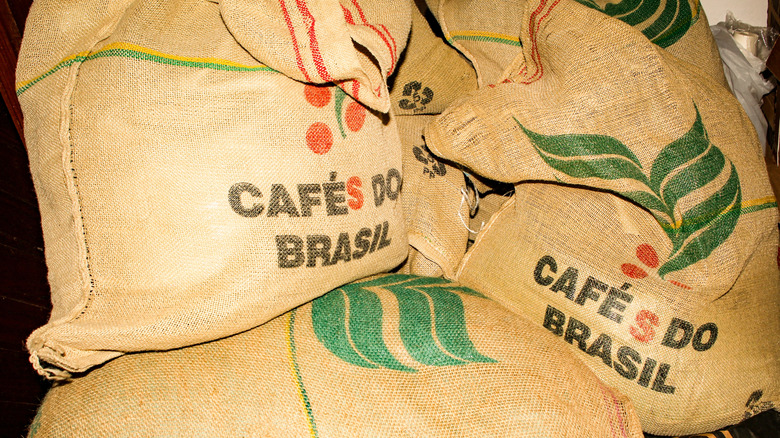The Only Type Of Beans You Should Use To Make Turkish Coffee
We may receive a commission on purchases made from links.
Everyone has a personal coffee palate, and rightfully so. Each set of human taste buds is unique, harboring from 2,000 to 10,000 buds per tongue. They detect varying ranges of sweet, sour, salty, bitter, and umami flavors. No wonder we all have different reactions to coffee blends, roasts, and bean characteristics. However, when it comes to certain preparations, such as Turkish coffee, a general consensus consolidates around certain components — most particularly, the type of beans.
When revealing nine mistakes everyone makes with Turkish coffee, Tasting Table writer Hunter Wren Meile zeroes right in on the quality and origin of the beans. In consultation with expert Bhavi Patel, dairy technologist and coffee writer of Banjaran Foodie, the number one blunder is "not using Brazilian beans." That's right, a deeply cherished coffee tradition in Turkey, purportedly originating in Yemen, comes alive when using South American beans from Brazil. There's a specific reason for that, and it's influenced by the exacting nuances of preparing Turkish coffee.
Why Brazilian beans are a must for Turkish coffee
Many factors make Turkish coffee taste different than drip coffee, but using Brazilian beans is crucial. The preparation depends on very finely ground beans, which dissolve and remain in the cup during consumption, rather than being filtered out as in other coffee drinks. That means the low acidity of Brazilian arabica beans really shines in this potent type of coffee.
Then there's the flavor component. Brazilian arabica beans bring a parade of earthy palate pleasures, including ashy, nutty, chocolatey flavors with sweet finishes. According to the curated information from Meile and Patel, another attribute of Turkish coffee arises from the peculiar "Rio defect," defined by a medicinal taste found only in Brazilian coffee beans. It started as an aberration, but has now come to define the depth and character of Turkish coffees, regardless of where they're consumed around the world.
When making your own Turkish coffee at home, choose high-quality Brazilian arabica beans, and spend extra time perfecting the grind. "To make great Turkish coffee, you need to grind coffee to a very fine powder, similar to the consistency of powdered sugar or fine talcum powder," says Patel. "Grinding it this fine increases the surface area of the coffee grounds and helps extract the maximum possible flavors from it during the brewing process." Pay attention as well to the amount of water; many people consider the ideal coffee to water ratio for Turkish coffee to be one part coffee to nine parts water.

